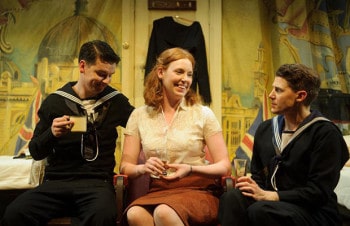Young & Jackson
Don Reid’s Young & Jackson is a tribute play of sorts. It’s a testimonial to Melbourne during World War II, to the pub it’s named after, and to the play that follows (Codgers, also by Reid). As such, it’s difficult to place Young & Jackson as a stand-alone work. There’s more than a few nods to Jules Joseph Lefebvre’s nude painting, Chloè, and the old timey phrases fly as fast as the lone pineapple tossed around onstage (so much so there’s a glossary to keep up).

Young naval recruits Jimmy and Keith (Jacob Machin and Charlie Cousins) have shacked up at the Young & Jackson awaiting their call to arms. Their last days of freedom are spent fighting with yanks at the bar downstairs, writing and performing their “male only” skits, and chasing a “drop of skin” or two. Jimmy is juvenile and temperamental, whereas Keith is calmer and has better intentions. Yet together, they present the male-centric views of mateship as a military virtue that we’ve already seen before.
It’s at the pub they meet Lorna (Gabrielle Scawthorn), a country girl who’s compelled to offer her services to the lads about to go off to war. Lorna is billed as the woman who will change their lives; however, despite her intentions and her own personal link to the tragedies of war, the character almost crosses over into manic-pixie-dream-girl territory. At times it feels as though Lorna exists solely to provide the main characters some life lessons.
Young & Jackson is presented as part of the Virgin Melbourne Fashion Festival and it’s certainly very pretty to look at. Set and costume designers Dann Barber and Michael Hili have done a spectacular job of creating a hotel room, front bar, and hospital ward that feels like (what I imagine) 1945 did. It’s a lovely place to be for 90 minutes.
Wayne Harrison’s directing places the actors up, down and side-to-side, and we twist and turn to follow the action. It’s a great use of space and keeps the show feeling fresh.
Annoyingly, the show skims the surface on many real issues of the time: repressed gay male sexuality, women’s rights, and post-traumatic stress disorder. It’s a highlight when Les (Sam Duncan) delivers his monologue about PTSD, but the play stays too focused on telling a story to delve further into any themes. Excellent aesthetics aside, perhaps it’s best that Young & Jackson shouldn’t be taken too seriously.

